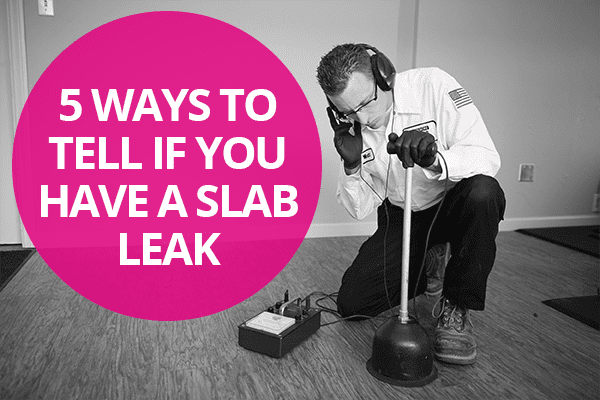
A hidden water leak beneath your home’s foundation can lead to severe structural damage, increased utility bills, and even health risks from mold growth. These types of leaks, known as slab leaks, often go unnoticed until they cause significant problems. If you suspect you have a slab leak, early detection, and professional repair are essential to protecting your home.
What Is a Slab Leak?
A slab leak occurs when pipes running beneath a home’s concrete foundation develop leaks due to corrosion, shifting soil, or excessive water pressure. Unlike visible plumbing leaks inside your home, slab leaks are hidden, making them difficult to detect until they cause noticeable damage.
Common Causes of Slab Leaks:
- Pipe Corrosion: Older homes with copper or galvanized steel pipes are more susceptible to corrosion, especially if the water supply has a high mineral content.
- Shifting Soil: The ground beneath your home naturally expands and contracts due to moisture changes. Over time, this movement can stress buried pipes, causing cracks and leaks.
- High Water Pressure: Excessive water pressure can strain pipes, leading to premature wear and potential leaks under your foundation.
Why Slab Leaks Are a Serious Problem
Ignoring a slab leak can lead to extensive and expensive damage to your home. Here are a few key reasons why slab leaks need to be addressed immediately:
- Foundation Damage: Water from a slab leak can erode the soil supporting your foundation, causing cracks, uneven floors, and even structural instability.
- Increased Water Bills: A continuous underground leak can waste thousands of gallons of water each month, leading to a significant spike in your water bill.
- Mold and Mildew Growth: Persistent moisture creates the perfect environment for mold and mildew, which can lead to health issues like allergies and respiratory problems.
5 Warning Signs of a Slab Leak
If you notice any of these warning signs, you may have a slab leak and should contact a professional for slab leak detection in San Diego [1].
- Unexplained Spike in Water Bills: One of the earliest signs of a slab leak is an unexpected increase in your water bill. If your water usage hasn’t changed but your bill has risen, you may have a hidden leak. According to the EPA, household leaks can waste nearly 10,000 gallons of water annually, many of which go undetected until they cause noticeable damage.
- Hot or Cold Spots on Floors: If you step onto your floor and notice an unusually warm or cool area, it could be due to a leaking hot or cold water line beneath the foundation. Hot water leaks are especially noticeable because the warmth can transfer through the flooring, creating distinct temperature differences.
- Damp or Wet Flooring: Wet carpet, warped hardwood, or damp tiles can indicate a slab leak, especially if the moisture appears in areas where plumbing isn’t directly exposed. Over time, this moisture can lead to mold growth and flooring damage, requiring costly repairs.
- Low Water Pressure: A sudden drop in water pressure throughout your home may indicate a slab leak. When a pipe leaks [2] underground, it reduces the amount of water reaching your faucets and appliances. Plumbing leak detection may be necessary if you experience persistent low water pressure without any apparent cause.
- Unusual Sounds of Running Water: If you hear running water when no faucets are on, it could indicate an underground leak. Try turning off all water sources in your home and listening closely. If you still hear water moving, it’s time to call a professional plumber.
What to Do If You Suspect a Slab Leak
If you think you have a slab leak, acting quickly can prevent costly repairs and extensive damage to your home. Even a small leak under your foundation can escalate into serious structural issues if left unaddressed. Here’s what you should do:
- Shut off your water supply: Locate your home’s main water shut-off valve [3], typically found near the water meter or in a basement or garage. Turning off the water will help minimize further leakage and damage.
- Check your water meter: After shutting off all water sources, monitor your water meter. If the dial continues to move, it indicates a hidden leak, likely under your foundation. Some meters also have a leak detection feature, such as a small triangular dial that spins when water flows.
- Call a professional plumber: A licensed plumber can use specialized tools such as electronic leak detectors, infrared cameras, and acoustic sensors to pinpoint the exact location of the leak without unnecessary digging. They can then recommend the best repair options, whether epoxy pipe lining [4], pipe rerouting, or direct repairs.
Early detection is key. The sooner you address a slab leak, the less damage it will cause to your home and foundation.
How Anderson Plumbing, Heating & Air Can Help
At Anderson, we specialize in slab leak detection in San Diego [1]. Our experienced plumbers use state-of-the-art technology to pinpoint leaks without invasive digging, helping to protect your home from unnecessary damage.
Why Choose Us?
- Expert Leak Detection: We use noninvasive methods such as electronic leak detection and infrared imaging to locate slab leaks accurately.
- Fast and Reliable Repairs: Our team offers a range of repair options, including pipe re-routing and epoxy pipe lining, to restore your plumbing without extensive excavation.
- 24/7 Emergency Services: Slab leaks don’t wait for business hours, and neither do we. Our emergency plumbing services [5] are available around the clock to address urgent leaks.
If you suspect a slab leak in your home, don’t wait until it causes severe damage. [6]Contact us [7] today [6] for professional slab leak detection and repair services [8] in San Diego.